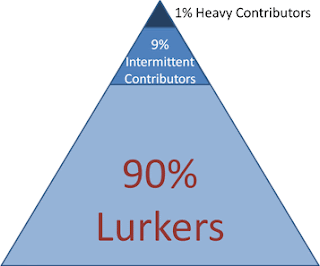Lurk on, dude, lurk on!
The other day, while catching up on my (ever growing) pocket reading list, I came across a post from, friend and fellow MobiMOOC colleague, Inge on MOOCs. It was a rather on-the-nose post about MOOCs, learning, assessment, and the discourse used in MOOCs about learners. Concurrently I am working with a Rhizo team on a social network analysis post where the topic of 'completion' came up, and we started discussing the real connotations of completion. How does one measure 'completion' in a MOOC? Is it a worthwhile metric? and what about engagement? Finally, to add to this volatile mix of intellectual ideas, I am working on a conferece presentation, with fellow lifelong learner and MOOCer Suzan†.
These raw materials made me think back to the early discussions on MOOCs (before the 'x' ones came out) and discussions about lurkers in MOOCs. Before the xMOOC came out we didn't seem to frame non-visible members of the community as 'dropouts' but rather as lurkers. There were probably people who quit the MOOC, as in they came, they saw, it wasn't for them, they left - but we left the door open for them to be lurkers if they wanted to.
Early on I viewed MOOC participation sort of similar to the participation patterns in a community of practice (at least those that I had learned in school) which are visually depicted by the image in this post. ~90% are lurkers, ~9% contribute, and ~1% contribute a lot‡. In one of my earlier MOOCs, #change11, I engaged more with the idea of lurkers, and the main thesis I had (at least in retrospect) was that at most they were harmless onlookers, at worst they didn't contribute to the continued well being of the community. I viewed (and still view) learning as a communal activity, so the more people participate in the network of learning the better the outcome for everyone. It allows depth of conversation, different discussions to take place, and diversity of opinion. When a lot of people lurk, my concern was, that a critical mass for community purposes would not be available so that a experience learning could either not get off the ground, or it would not be possible to sustain it.
Fast forward to 2015. After more than 100 xMOOCs, cMOOC, pMOOC, rMOOC, αMOOC, βMOOC, γMOOC, and other free online learnign experiences I am not really sure where I stand on the subject of lurkers. Well, I do, but I am also conflicted. See, learner choice is one big aspect of learning. You cannot really force anyone to learn something, or participate in some experience. This holds true for open learning experiences like MOOCs, and for closed experiences (paid courses, seminars, workshops, etc.). Intrinsic motivation is important in learning, and it's what pulls the learner through times, both easy and difficult. In this aspect, if what motivates learners is for them to lurk, or just participate in certain weeks or modules, then that is not only perfectly OK, it should be encouraged.
The point of conflict, however, comes in kicstarting and sustaining the learning community. Let's say I am an open learning designer♠ and I have this awesome course I am thinking of designing for a certain demographic. Sort of like hosting a party I don't want it to fail. I want people to attend, be engaged, and have fun (and learn something in the process). What can I do to make sure that there is a minimum mass to sustain the course through it's x-week duration? Do I do anything to recruit and tend to the learning garden? Or do I let it run wild, and if it succeeds - then great, and it fails (like a lame party), then that's OK too?
I guess what I am asking (and proposing a discussio on) what are some #altMetrics for MOOC success other than visible participant engagement, or 'course completion', or any one of the traditional success factors? By de-coupling attendance from success metrics, I think we can be quite fine with having a ton of lurkers in our MOOC, and still having a MOOC be a success. Lurkers get what they need, active participants get what they need, course designers get what they need. It's a win-win. But - how do you get there?
Thoughts?
SIDENOTES:
† You know, when I tell people (who already have a PhD) that I am pursuing my EdD online through Athabasca University I get a bit of a sour face. They can't fathom how you can develop academic relationships that lead to stimulating discussions (and papers) at a distances. Between my cohort and the people I've met in MOOCs I think I have had more mental stimulation that people in residential programs - just saying ;-)
‡ Wonder if this triangle is a distortion, sort of like Edgar Dale's corrupted cone...
♠ Mark my words, Open Learning Designer will be a job title soon enough if it's not already. Prbably a type of instructional or learning designer ;-)




Comments